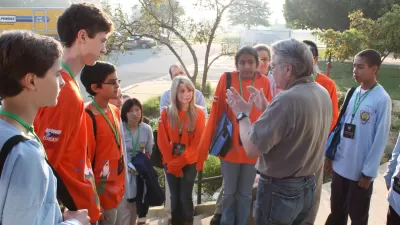As students plan their spring semester courses and make early plans for the summer, they often wonder how to choose a planning specialization or concentration. They ask how important the concentration is for their future career as a planner.

As students plan their spring semester courses and make early plans for the summer, they often wonder how to choose a planning specialization or concentration. They ask how important the concentration is for their future career as a planner. The answer to the second question is that the specific concentration is less important than many think. However, the overall balance of knowledge, skills, and values does shape a planners future to some extent. The following points illustrate these two points.
Often planners have skills in overlapping areas and use this to broaden their job search. The last couple of planning schools where I have worked have not printed concentrations on people’s transcripts. Laying aside the fact that few employers ever actually look at transcripts, the students have found this lack of specificity to be beneficial. While they may have officially specialized in housing they may well be able to list a coherent set of land use, real estate, or smart-growth related courses, internships, and other experiences on their resume and claim to be ideally suited to jobs in those areas.
Even with a clear concentration, many people quickly move to jobs outside their declared area by focusing on similarities in skills and values. I have lost count of the number of students who specialized in economic development but landed jobs in transportation and became terrific transportation planners over time. They parlayed their interest in analytical methods, economics, and implementation in one subfield of planning to similar concepts and methods in another.
Some planning students use concentrations to reinforce their existing knowledge but others use them to fill gaps or reinforce interdisciplinary expertise. I see many transportation engineers come to planning school to learn transportation planning or landscape architects planning to gain skills in land use regulation. For these students the planning core—history, theory, planning methods, implementation skills, ethics—may be the most important component of the curriculum. It allows them to get a sense of the culture of planning while their concentration just helps maintain their expertise. However, others use their specialty to move into new areas—they have trained in sociology but learn real estate. Both paths have strengths.
Specializations evolve so what matters in the long-term are higher-level skills and knowledge, and using the specialization to learn how to learn. My own story is a case in point. After an architecture undergraduate degree, an increasingly rare preparation for planning, I chose to specialize in social policy and analysis. This is a focus that UCLA no longer offers and many of the social programs I learned about are primarily of historical interest. But the specialty gave me terrific training in analytical methods, theoretical reasoning, and understanding social inequality and change. This training has been really useful as I worked in the areas of sustainability and healthy planning. I imagine this is a common story in planning.
Concentrations or specializations are important, then, but in different ways for different people.
After 6 years of keeping to a one blog per month schedule, I was not able to do it in the last year—so I took a sabbatical for much of the year. I am now returning to regular columns.

Planetizen Federal Action Tracker
A weekly monitor of how Trump’s orders and actions are impacting planners and planning in America.

Maui's Vacation Rental Debate Turns Ugly
Verbal attacks, misinformation campaigns and fistfights plague a high-stakes debate to convert thousands of vacation rentals into long-term housing.

Restaurant Patios Were a Pandemic Win — Why Were They so Hard to Keep?
Social distancing requirements and changes in travel patterns prompted cities to pilot new uses for street and sidewalk space. Then it got complicated.

In California Battle of Housing vs. Environment, Housing Just Won
A new state law significantly limits the power of CEQA, an environmental review law that served as a powerful tool for blocking new development.

Boulder Eliminates Parking Minimums Citywide
Officials estimate the cost of building a single underground parking space at up to $100,000.

Orange County, Florida Adopts Largest US “Sprawl Repair” Code
The ‘Orange Code’ seeks to rectify decades of sprawl-inducing, car-oriented development.
Urban Design for Planners 1: Software Tools
This six-course series explores essential urban design concepts using open source software and equips planners with the tools they need to participate fully in the urban design process.
Planning for Universal Design
Learn the tools for implementing Universal Design in planning regulations.
Heyer Gruel & Associates PA
JM Goldson LLC
Custer County Colorado
City of Camden Redevelopment Agency
City of Astoria
Transportation Research & Education Center (TREC) at Portland State University
Jefferson Parish Government
Camden Redevelopment Agency
City of Claremont






























